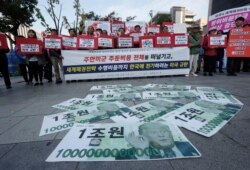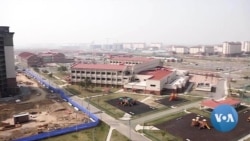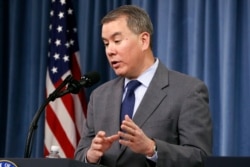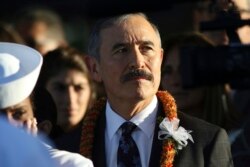Nearly a month after the expiration of the agreement on how to split the cost of the U.S. military presence in South Korea, there is growing frustration among South Korean civilians who will soon be temporarily suspended from their jobs on U.S. bases if a deal isn’t reached.
The U.S. military this week sent furlough notices to its Korean national employees, around 9,000 of whom may be forced to take unpaid time off starting April 1, without an agreement. Some have begun looking for other work.
“Of course, everyone feels unstable and distressed,” said Son Gi-o, the national secretary general for the USFK Korean Employees Union, “It is our livelihood, after all.”
Like other Korean base employees who spoke to VOA, Son hoped an agreement will be reached but said he feels insulted and that the contribution of his Korean colleagues is being undervalued.
A South Korean national who works at Camp Humphreys, the sprawling U.S. base about an hour south of Seoul, said he was optimistic a deal would be reached but said, nevertheless, “we can’t focus at work.” He was not authorized to speak to the media and would not provide a name.
No new agreement
For the second consecutive year, the U.S. and South Korea failed to strike a new cost-sharing deal before the old agreement expired. During initial rounds of negotiations, the U.S. reportedly demanded Seoul increase its contribution by five times.
U.S. President Donald Trump has long insisted that South Korea pay much more for the cost of about 28,500 U.S. troops in South Korea.
However, many analysts and officials in both the U.S. and South Korea fear those demands are now creating distrust among South Koreans and structural instability that could hurt the alliance in the long term.
Money running out
Since the latest deal expired, U.S. officials say “residual funds” have been used for the salaries of Korean civilian employees, who work in areas such as food service, logistics, and administration, but that money will soon run out.
“It isn’t right to hold hostage the salaries of Korean employees,” Song Young-gil, a prominent lawmaker in South Korea’s ruling Democratic Party, said. “President Trump’s unreasonable demand is weakening the alliance.”
Although opinion polls suggest South Koreans overwhelmingly oppose the U.S. cost-sharing demands, support for the overall alliance remains strong. There are few signs of a major rift other than angry newspaper columns and scattered protests.
WATCH: Frustration in South Korea as Cost-sharing Talks With US Drag On
Alliance strained
Many U.S. and South Korean officials, however, worry about the effect of such prickly negotiations every year.
“It could be a three-year deal, or five years. But a one-year agreement is not right,” Song said, “It is just too much to have to repeat this every single year.”
The U.S. and South Korea were unable to reach a deal last year until early February. Seoul eventually agreed to pay $925 million, 8% more than the previous year.
The deal, though, only covered a single year rather than five, as in the previous arrangement, virtually ensuring the two sides are in an almost constant state of tense negotiations.
“I think a one-year agreement creates a considerable amount of turbulence in the support structure for the U.S. forces,” said retired Army General Vincent Brooks, who until November 2018 served as commander of U.S. Forces Korea.
An annual deal is not sufficient to plan for local employment needs and South Korean-funded construction projects, Brooks told the VOA Korean Service.
“It’s very disruptive to have a one-year cycle. I think a minimum of three and an optimum of five is the right way to go,” he said.
Interagency friction?
Even current U.S. military officials have expressed concerns about the cost-sharing dispute.
John Rood, a senior Defense Department official, told a U.S. House hearing this week that the Pentagon is trying to convey the importance of the alliance to his State Department counterparts leading the negotiations.
“This is part of our message to our State Department colleagues: that as you’re approaching these negotiations — and everyone wants equitable burden-sharing — some consideration just needs to be given about the maintaining of the health of that alliance as we go forward,” Rood said.
Those comments suggest a degree of “interagency friction,” according to David Maxwell, who specializes in the U.S.-South Korea military relationship at the Foundation for Defense of Democracies. “The Department of Defense pointing the finger at the Department of State is unusual,” Maxwell said.
However, State Department cost-sharing demands seem to originate with Trump — not the State Department — and U.S. officials have little choice but to implement the president’s directive, as Maxwell points out.
“I have heard none express a personal opinion that goes against the president, despite my belief they must be biting their tongues because they know, as I believe, this demand by the president is unrealistic, damages the alliance, and is just plain wrong,” he added.
Harry Harris, the U.S. ambassador to South Korea, earlier this month denied that the negotiations are hurting the alliance, saying the U.S. is only “asking for a more equitable distribution.”
Specifically, the U.S. wants South Korea to contribute toward a wider range of costs, including the rotations of American troops to the peninsula.
Meanwhile, it is the local Korean employees who may be the hardest hit as the talks drag on.
“All employees are essential for accomplishing the mission,” Son, the labor union employee. “So why do we have to be the ones to suffer?”









